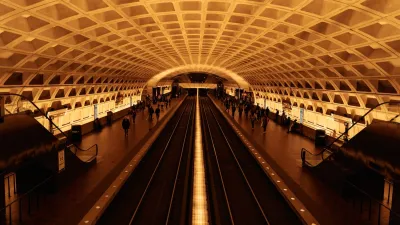In the wake of yesterday's surprisingly unsurprising announcement that U.S. Secretary of Transportation Ray LaHood is stepping down, several reporters who focus on transportation issues have taken stock of his tenure.
Beloved by many in the transportation community for his often outspoken advocacy for alternative modes, the former Republican congressman from Peoria was a signature cross-party pick for President Obama’s his first cabinet. "At the time, LaHood was little known outside his district, and no one expected him to make many waves. Those people were wrong."
provides a roundup of his most significant accomplishments, and battles:
He tangled repeatedly with Congress on high speed rail and shutting down the FAA. An avid cyclist, LaHood once jumped on a table at a Washington, DC bicycle conference to emphasize his enthusiasm for cycling as transportation. A Buick driver, LaHood was especially passionate in his anti-distracted driving campaigns, pushing back not only against texting but also against shaving and applying make-up while driving. He was known to take immediate action if he witnessed distracted driving. “What I’ve been doing is kind of honking at somebody if I see him on a cellphone,” he once told a local DC radio station.
LaHood shepherded through spending on high speed rail, stimulus funding, and innovative transportation projects like bus rapid transit. But he and the Obama administration were unsuccessful in convincing Congress to expand high speed rail and infrastructure funding. He also failed in convincing NJ Governor Chris Christie to save the NJ Transit tunnel under the Hudson.
At Reconnecting America, Sarah Kline praised the "Secretary's ability to work across the aisle and garner bipartisan support for transportation funding and reform," and for elevating transportation in the national conversation.
At The Atlantic Cities, Emily Badger notes the seismic shifts in how "Washington thinks about transportation and the federal government’s role in it," and outlines the "5 ways the next U.S. Secretary of Transportation will be forced to follow Ray LaHood's lead."
Finally, we give the last word to LaHood himself, who "took some parting shots at lawmakers, mainly his fellow Republicans, for lacking a vision on infrastructure proportional to current demands" in an exit interview with The Huffington Post. "[A]s he gets set to leave the Department of Transportation," writes Sam Stein, "he argued that the Obama agenda would ultimately prove to be the trendsetter."
"As members of Congress understand that the people are way, way ahead of them on this -- they are way ahead of most members, certainly on the Republican side, when it comes to high speed rail, or walking and biking paths, or livable, sustainable communities, green energy, the people are so far ahead of the politicians on this -- eventually it will catch up with them," he said.
FULL STORY: BREAKING: U.S. Transportation Secretary Ray LaHood: I’m Out

Alabama: Trump Terminates Settlements for Black Communities Harmed By Raw Sewage
Trump deemed the landmark civil rights agreement “illegal DEI and environmental justice policy.”

Study: Maui’s Plan to Convert Vacation Rentals to Long-Term Housing Could Cause Nearly $1 Billion Economic Loss
The plan would reduce visitor accommodation by 25% resulting in 1,900 jobs lost.

Planetizen Federal Action Tracker
A weekly monitor of how Trump’s orders and actions are impacting planners and planning in America.

Waymo Gets Permission to Map SF’s Market Street
If allowed to operate on the traffic-restricted street, Waymo’s autonomous taxis would have a leg up over ride-hailing competitors — and counter the city’s efforts to grow bike and pedestrian on the thoroughfare.

Parklet Symposium Highlights the Success of Shared Spaces
Parklets got a boost during the Covid-19 pandemic, when the concept was translated to outdoor dining programs that offered restaurants a lifeline during the shutdown.

Federal Homelessness Agency Places Entire Staff on Leave
The U.S. Interagency Council on Homelessness is the only federal agency dedicated to preventing and ending homelessness.
Urban Design for Planners 1: Software Tools
This six-course series explores essential urban design concepts using open source software and equips planners with the tools they need to participate fully in the urban design process.
Planning for Universal Design
Learn the tools for implementing Universal Design in planning regulations.
Caltrans
Smith Gee Studio
Institute for Housing and Urban Development Studies (IHS)
City of Grandview
Harvard GSD Executive Education
Toledo-Lucas County Plan Commissions
Salt Lake City
NYU Wagner Graduate School of Public Service



























